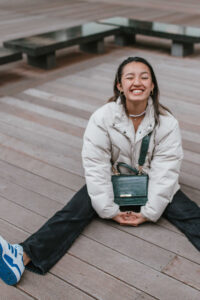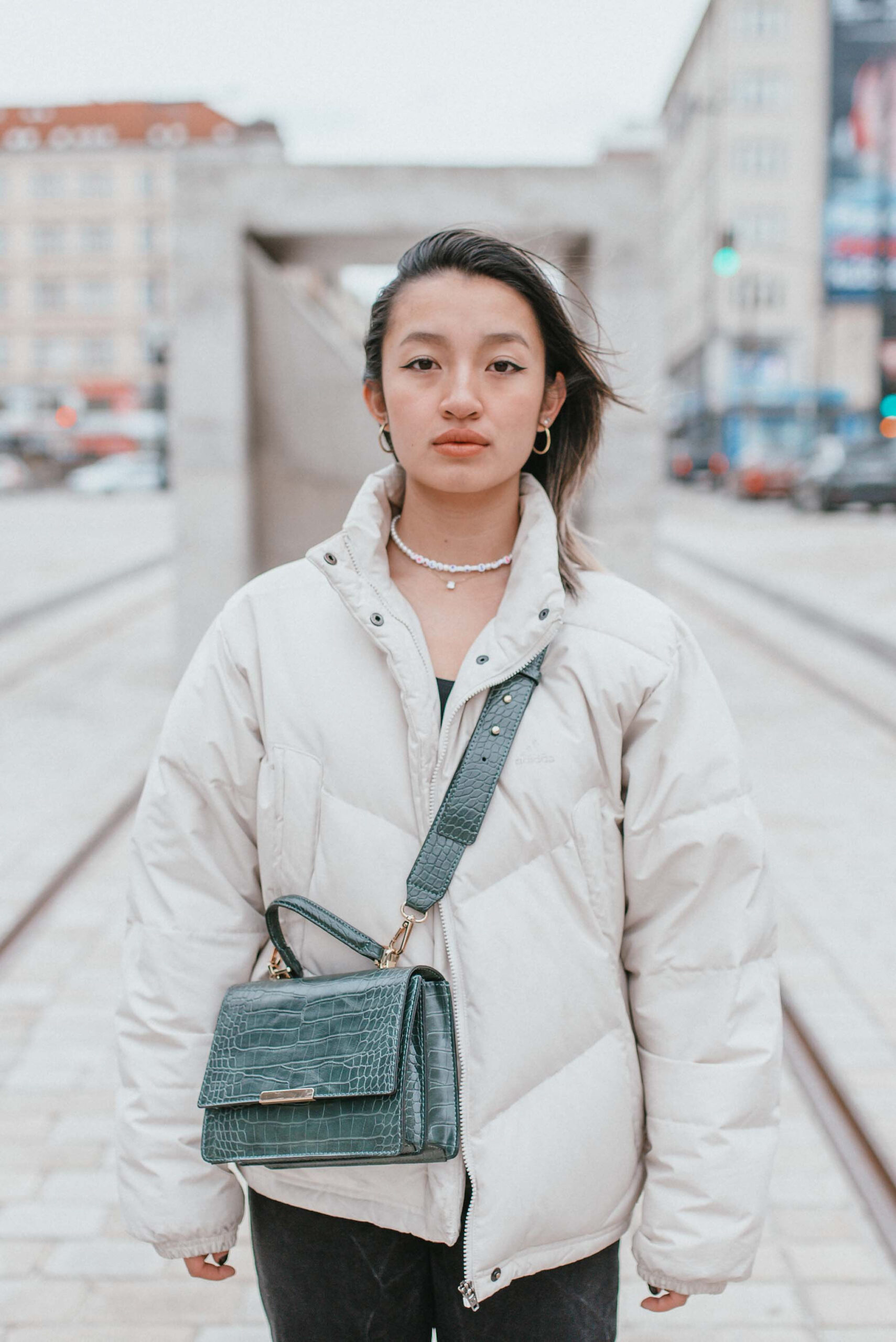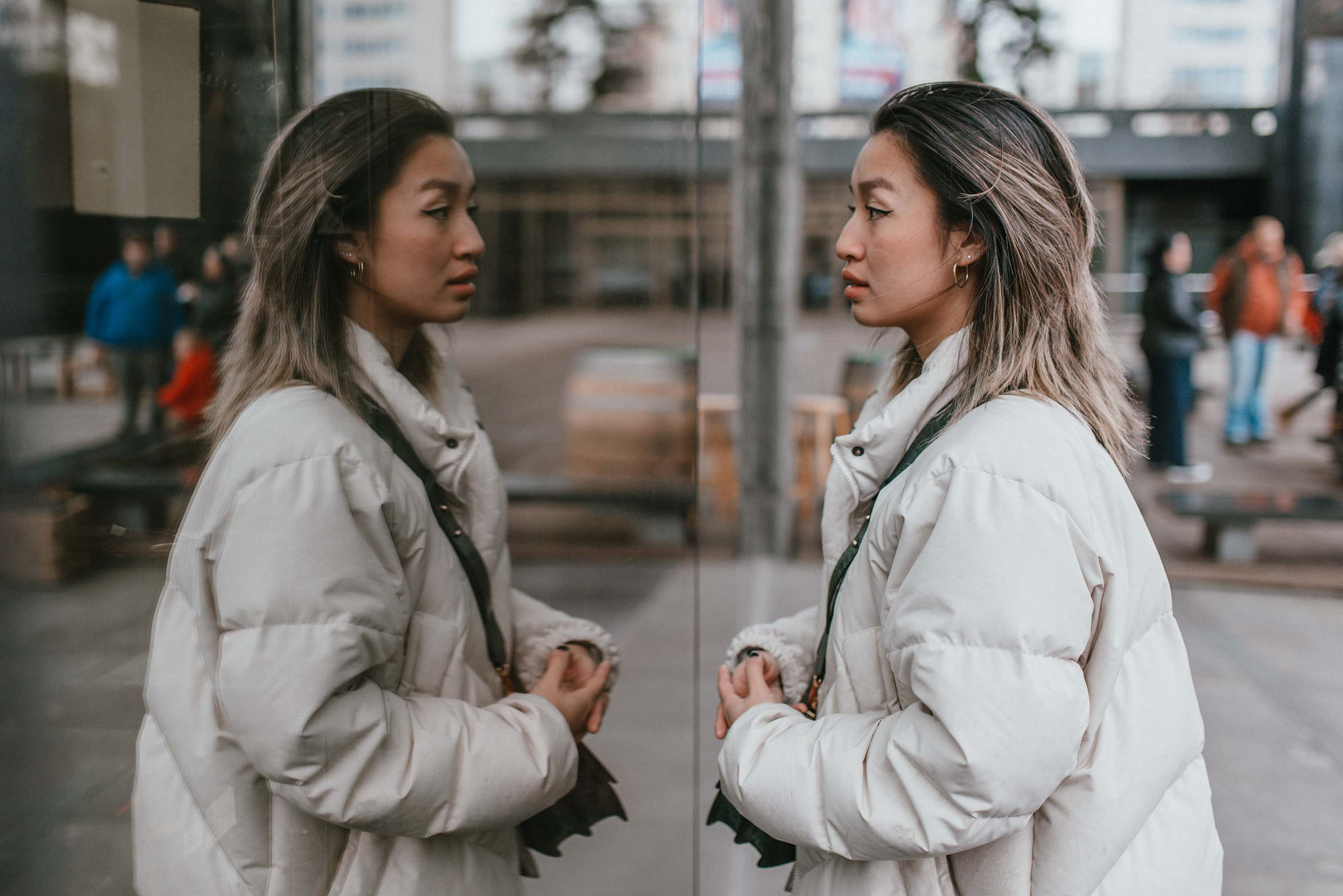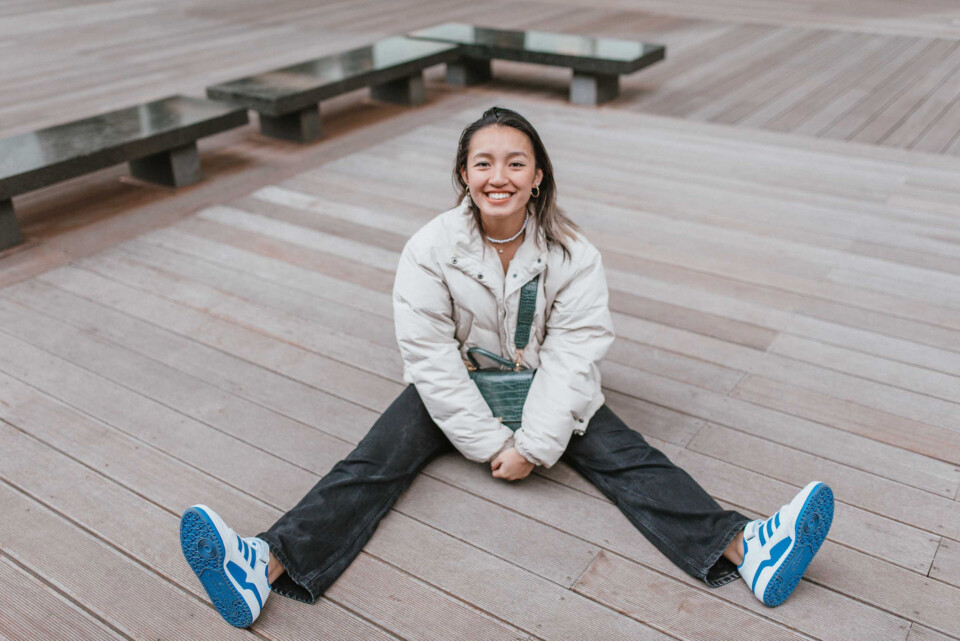K R I S T Y N A
Prague | 2022

K R I S T Y N A
City — Prague
Age — 20
Love life — Single
Profession — Student, Photographer, Podcast host
Years in Prague— 19
Location in Prague — National Museum
T H E P R A G U E S T O R I E S
‘I REALIZED
THAT I
SHOULD
STOP TRYING
TO FIT IN’

- What makes you happy? “Many things! I feel at my best when I’m working on a photography project with a creative team, meeting like-minded people. And when I’m spending time with my parents and sisters and their babies, or working on my personal development and getting out of my comfort zone. I do that quite a lot, I’m pretty impulsive. My most recent impulsive decision was to travel to The Netherlands by myself and take pictures of strangers on the streets there. Something else I enjoy – but haven’t done for a while – is hosting the podcast ‘Pod Slupkou Banánů’, about the second-generation Vietnamese-Czech community. The Vietnamese are one of the biggest minority groups in the Czech Republic. ‘Pod Slupkou Banánů’ is a nickname for my generation. It means ‘under the peel of the banana’: we’re yellow on the outside as we look Vietnamese, but on the inside, we’re white, as we are raised in the Czech Republic. It is how I identify myself: I don’t feel 100% Vietnamese, but I don’t feel 100% Czech either. I often talked about this with my ‘banana’ peers and in the podcast. We wanted to explore these emotions and feelings more.”
- What kind of feelings are those? “When I was younger, it was quite difficult to know who I was and understand why I felt lost. I struggled with not knowing where I would fit in. I sometimes felt like an imposter. For example, at a family gathering, my opinions and mindset would be different from my parents’ friends. But I couldn’t find the Vietnamese words to express what I meant exactly. For a while, I thought I fit in most in the Czech culture, but then I found out that the parents of my Czech friends weren’t as strict as mine and used a different love language. They hugged each other, said ‘I love you’ and talked about what was going on in their lives like they were friends. I didn’t have this connection with my parents. Their love language is taking care of everything: cooking for me, giving me a place to live and taking care of me when I’m sick. I missed a more emotional connection when I was younger. To change this, I started opening up to my parents, expressing my emotions and hugging them. Nowadays, I just come up to my mom and say: ‘Hi mom, do you still love me?’. I make her tell me that she does. It was hard for her at first, but it opened up new doors for her, too. We communicate more now, which feels great.”
- What is your biggest takeaway from the podcast? “I realized that I’m half; I’m in the middle of two cultures. And that I should stop trying to fit in or conform to the norms. Instead, I decided to reevaluate my values and take the best of both worlds and cultures. I took the freedom and liberty of the Czech culture. Especially the freedom: you can do whatever you want and go wherever you want. From the Vietnamese culture, I love the tradition of family bonding. We stick together and stay in touch no matter what. It’s always there: family is important to us.”
- What is your best personality trait? “I guess that I’m hard-working and determined. When I want something, I go after it. For instance, even though I had a lot of friends in high school, I decided to switch schools. I felt spending eight years in the same environment would be too long.”

- What is your biggest life lesson so far? “That things take time. I believe in faith: if something is meant to happen, it will. When I was unsure about a situation in my life, it always turned out to be for a reason. But at the time, I didn’t understand why things didn’t go easier or weren’t solved faster. But it always became clear there was a good reason. For example, switching high schools turned out to be valuable, because having to study less gave me more time for photography and volunteering. And at my new school, I was able to change as a person without being judged. If you stay in the same environment but suddenly start to act differently, you have to explain yourself.”
- What is your biggest struggle? “Accepting myself and accepting that I make mistakes. It’s something that comes up a lot in therapy. I’m not sure why it is so hard for me, because there’s no one else who is pushing me or giving me a hard time about my mistakes. It’s just me. I am determined to be the best. But I feel like I’m not always doing everything I can, because I’m scared of making mistakes. When I put in less effort, I’m not surprised when I don’t get the best results. But if I give a 100% and the result is not 100%, it’s a problem for me.”
- What is the best thing that ever happened to you? “My trip to Rome with two good friends, last summer. It was remarkable: I felt alive again after a long time. I graduated last year and felt like I had been in robot-mode the whole time. But in Rome, I started taking pictures of a group of strangers, we became friends and spent the entire trip together. They were from Chile, so they had this South-American vibrancy – a fuel that I haven’t seen in other people. It gave me a boost; it woke up the child in me and made me feel fully alive again. I will always remember that trip.”
- What is the best advice someone has ever given you? “Tough one – I seek advice a lot and get advice all the time. But there is something my sister told me when I was young, about the Law of Attraction. She told me that if you think something bad will happen, it will. And if you think something good will happen, it will. That stuck with me and resonates with my belief that everything happens for a reason.”
- What advice would you give to other women? “Speak up for yourself. Many women choose to silence themselves to let other people speak. But everyone’s opinion matters. Women struggle more with it than men, because they are more empathetic and sensible. But, sometimes, you have to be selfish and tell people how you feel, even though they’re not going to accept it. Learn how to express yourself without being scared of being judged. It doesn’t matter if another person will like your opinion or not – the most important thing is that you’ve expressed your true self. It’s not easy for me to do this. I’ve been working on it for the past year. It’s slowly getting better. I talk about this a lot with my best friend. We tell each other a lot but see each other so little that we don’t share the emotions behind our stories. We’re just catching up on everything, so there’s no time to talk about how we feel or how something felt. When we discussed this, we realized how important it is for our friendship to express our emotions. And then we had a moment.”
- What is your biggest sadness? “That would be my first heartbreak. I was 14 years old, so it’s six years ago now. I saw the relationship I had with my first boyfriend as something magical. I guess the first love always is. I took it hard, having my heart broken. I spent a lot of time outside, listened to heartbreak songs, cried in bed and read and wrote a lot.”
- What is your biggest dream? “Leading a fulfilling life where I’m doing fulfilling things with people who make me feel fulfilled. And I fulfill the people around me, so it’s a give and take. I do already feel like this, but there’s more to come. Also, there’s something I promised my parents when I was little. One day, I drew a house with five floors and a swimming pool, and I told my parents: ‘I’m going to build or buy a house like that’. And they keep reminding me now and then. It stays in the back of my mind as well. One day, I’ll be able to do this. That will be pretty great.”
- What is a big issue in the Czech Republic from a feminist perspective? “There’s a big issue on how people should dress. People still have opinions about a boy wearing nail polish or a skirt, or about girls wearing oversized pants. That should change. On social media, there are a lot of nasty comments about how a person dresses, or whether a person is wearing makeup, not wearing makeup or wearing too much makeup. I don’t know if it happens on the streets as well, because I wear my headphones on high volume. Although, I’ve heard stories where people encountered it there, too. People stare a lot. I experience this as well: I wear oversized clothes because it’s comfier. Even my sisters make fun of me, but not in a bad way. I guess it’s a fear of diversity. When people are used to something, they don’t want to open their minds to something else.”
- What does Prague mean to you? “A lot! When I was younger, I did not like Prague that much. Although it’s the most open-minded city in the Czech Republic, I thought the people here were quite negative, and I wanted to get out. But the more I saw of the city, the more I realized it’s a big city with beautiful places and diverse people. Now, I have a lot of beautiful memories with beautiful people – I don’t encounter that negative mindset much. I guess Prague conveys a lot of different emotions to me.”
Photos by Nataliya Yashchuk

